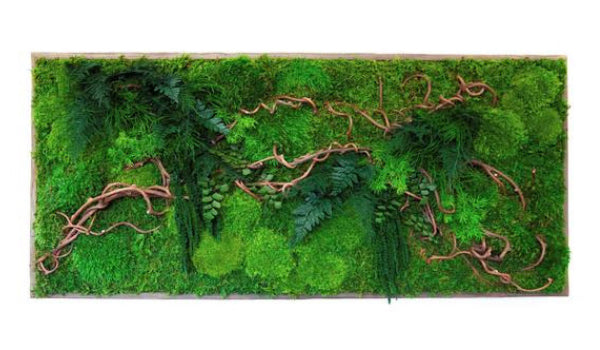Your Cart is Empty
Handmade & Sourced in the USA. Now Offering Complimentary Shipping!
Handmade & Sourced in the USA. Now Offering Complimentary Shipping!
Types of Moss & Ferns We Use in Our Art
October 31, 2022 4 min read

There are over 22,000 types of moss and all are unique and beautiful in their own ways. However, through the years of creating art with moss, we have found we prefer certain types of plants that we can source sustainably and preserve naturally.
We don't often disclose our techniques for making our art or how we preserve our plants, but, here we offer a rare insight into what types of moss, as well as some of the types of ferns and grasses you'll find in our pieces.
Types of Moss
Bryophyte Moss

Bryophyte is a general category of nonvascular plants, it actually encompasses not only the thousands of species of moss but also liverworts and hornworts. Bryophytes by definition are naturally flowerless, with simple leaves that will only be one cell thick, they do not have seeds are usually around 10cm high. They are incredibly versatile and can be found growing all over the world in a variety of climates, on rocks, trees and bare soil.
Moss is used in the art for a variety of reasons including to improve productivity and reduce stress. Studies have also highlighted that moss can help remove pollutants from the atmosphere, providing a cleaner and safer environment.
Moss Bun/Pole Moss
Bun Moss - also known as Bryophyta is a natural product that is popular for both moss walls and art. The moss is raised in appearance, separating it from other types including flat moss. Every piece of moss bun is different in size and shape. There is also typically tonal differences. As such, it provides a pleasing aesthetic and offers sensory benefits too. It helps create a vibrant and stunning environment. Bun moss may be referred to as pole moss and provides a highly intense green color. It also has no stems or leaves, providing a neat yet lush aesthetic.
Flat Moss

As the name suggests, flat moss is a flat sheet of moss and grows in a wide range of shapes and sizes. Similar to moss bun, this does provide a bright green shade that looks incredible and there are no stems or leaves. With flat moss, you can create a more minimal display in your environment that doesn’t intrude upon the space. However, it still provides all the same benefits.
Types of Ferns & Grasses
Asparagus Fern

Asparagus fern - also known as asparagus setaceus - or perhaps lace fern is a climbing fern. A fascinating point about this plant is that it’s not actually a true fern. Although, it certainly has the aesthetic of one. It is commonly used as an ornamental plant and has a soft texture with gentle features. The leaves can be up to 7mm long and provide a beautifully soft, foliage. The asparagus ferns have become popular as interior decorations because they will grow virtually anywhere. They’re commonly used in waiting rooms because they are believed to have calming qualities. These plants are native to Africa and look incredible as part of hanging art.
Bear Grass
This is also known as turkey beard but we think you’ll agree bear grass sounds far more pleasant. With a smooth texture, this plant is light green in color and has an unbranched stem. The stem actually has tufts of grasslike rough-edged leaves that are quite narrow. Above, the leaves are similar while at the top of the stem, white flowers tend to develop. This plant grows in North America and flowers every five or seven years. The light shades of this plant make it particularly unique with a feather-like texture that looks incredible.
Sea Star Fern

This is another delicate fern that has a beautiful appearance. It has fine texturing and has nearly an entire circles of fronds. This is commonly used as a complete stem and is often seen as a collar in bouquets. In hanging art, the sea star fern looks fantastic on a cream or white background and provides a stunning contrast. The beautiful quality of this plant is always going to be eye-catching and the subdued shades will fit in well with any type of decor.
Woodland Fern

Ferns are actually one of the earliest type of plants and have evolved over 300 million years. Woodland ferns are the largest male fern and grow in clumps. This evergreen fern is also known as Asplenium scolopendrium, is particularly attractive and can grow in drifts between trees and rocks. The fern has delicate fronds which mean that they have been used by horticulturalists for decades. It was particularly popular during the Victorian era. There are a wide variety of different species of woodland fern that all provide different shades and aesthetic qualities. As such they offer a great deal of variation that ensures we can create stunning art.
These are just a few of our favorite mosses, ferns and grasses that are used in our creations. If you have any questions about the plants we use or different types of moss, feel free to reach out to us! Shop our complete moss wall art collection or learn more about how we turn these green plants into sustainable and beautiful plant paintings®.
Leave a comment
Comments will be approved before showing up.




